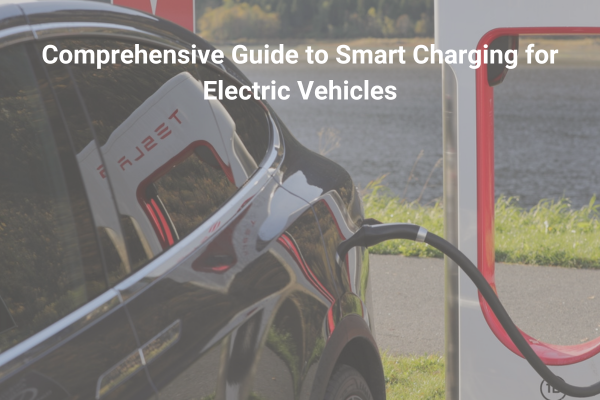Comprehensive Guide to Smart Charging for Electric Vehicles


In this blog, we will delve into the world of smart charging and explore how BMS technologies are revolutionizing the charging process for electric vehicles.
To grasp the importance of Battery Management Systems (BMS) in optimizing charging efficiency, it's essential to first understand the different battery charging processes. Electric vehicle (EV) batteries typically go through three charging stages: bulk charging, absorption charging, and float charging.
During the bulk charging stage, the battery receives a high current to quickly replenish its charge. This allows the battery to reach a certain voltage threshold, usually around 80-90% of its total capacity.
Once the battery approaches its voltage threshold, it enters the absorption charging stage. In this phase, the charging current decreases, and the battery gradually absorbs the remaining charge while stabilizing its voltage.
Finally, the battery enters the float charging stage, where a low charging current is supplied to maintain the battery's charge level without overcharging it. This stage helps prolong the battery's lifespan by avoiding excessive stress on its cells.
Optimizing these charging processes is crucial for efficiency, battery health, and user convenience. Here's where BMS comes into play. BMS actively monitors and controls the charging process to ensure optimal performance. It collects data on parameters like state of charge (SOC), voltage, current, and temperature to make intelligent charging decisions.
BMS helps regulate the charging current, preventing overcharging and undercharging, which can both negatively impact battery health. It also manages the charging rate, adjusting it based on factors such as battery temperature, available power, and charging infrastructure capacity.
Additionally, BMS enables the integration of smart grid technologies for demand response. By communicating with the power grid, BMS can schedule charging during off-peak hours or when renewable energy generation is at its peak. This not only maximizes the utilization of clean energy sources but also helps stabilize the grid by balancing electricity demand.
Charging an electric vehicle (EV) efficiently is crucial for maximizing range, minimizing charging time, and prolonging battery life. Battery Management Systems (BMS) play a vital role in optimizing charging efficiency by actively monitoring and controlling the charging process. Let's explore how BMS achieves this optimization.
Charge Rate Control: BMS monitors the battery's state of charge (SOC), voltage, and temperature to control the charging rate. It ensures that the charging current remains within safe limits and adjusts it based on the battery's condition. By optimizing the charge rate, BMS prevents overcharging and minimizes charging time, making the process more efficient.
Temperature Management: BMS monitors the battery's temperature during charging and adjusts the charging rate accordingly. Charging at high temperatures can degrade the battery while charging at low temperatures can result in slower charging. BMS helps maintain the battery's temperature within an optimal range, enhancing charging efficiency and preserving battery life.
Balancing Cell Voltages: In a battery pack, individual cells may have slight voltage variations, which can impact charging efficiency. BMS ensures that the charging current is distributed evenly among the cells, balancing their voltages. This equalization process optimizes charging efficiency and helps maintain the overall health of the battery pack.
Charging Protocol Compatibility: BMS facilitates communication between the charging infrastructure and the vehicle to ensure compatibility and adherence to charging protocols. It ensures that the charging process follows safety standards and protocols such as SAE J1772 or CCS, enabling seamless and efficient charging at different charging stations.
Smart Grid Integration: BMS enables integration with smart grid technologies, allowing the vehicle to interact with the power grid. Through bidirectional communication, BMS can schedule charging during off-peak hours or when renewable energy generation is abundant. This not only maximizes the utilization of clean energy sources but also helps balance electricity demand on the grid, contributing to more efficient and sustainable charging infrastructure.
Data Monitoring and Analysis: BMS collects and analyzes data on various parameters such as SOC, voltage, current, and temperature. This data provides insights into the battery's charging patterns, performance, and health. By monitoring this information, BMS can detect abnormalities, diagnose potential issues, and optimize charging strategies for improved efficiency and longevity.
User-Friendly Features: BMS incorporates user-friendly features that enhance charging efficiency. For example, it can provide real-time charging status updates, estimate charging time, and offer remote monitoring and control through smartphone applications. These features allow EV owners to manage and optimize their charging process conveniently, improving overall efficiency.
In conclusion, Battery Management Systems (BMS) are instrumental in optimizing charging efficiency for electric vehicles. By actively monitoring and controlling the charging process, BMS ensures safe and efficient charging, maximizing the range and battery life of EVs. With features such as charge rate control, temperature management, cell voltage balancing, charging protocol compatibility, smart grid integration, data monitoring, and user-friendly functionalities, BMS technology is revolutionizing the charging experience.
Take the next step towards driving a smarter and more sustainable future. Visit our website or contact our sales team to explore our range of electric vehicles and experience the power of advanced BMS technology. Together, let's embrace the future of smart charging and unlock the full potential of electric mobility.